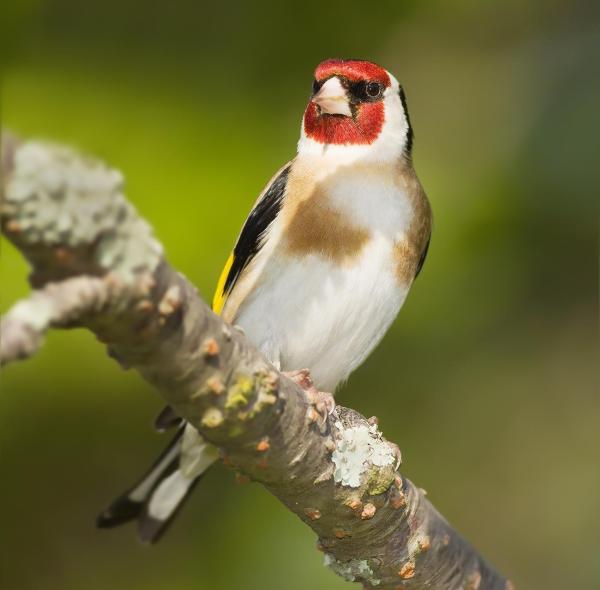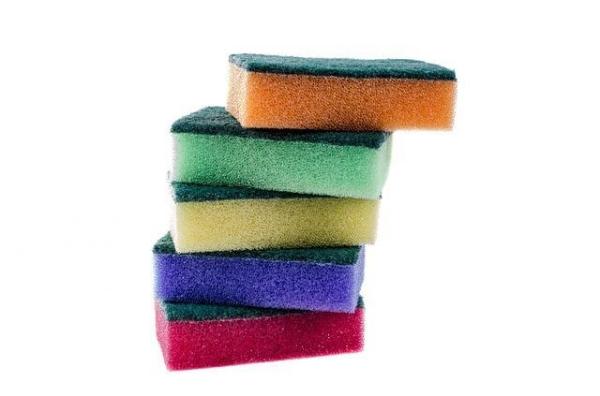
The goldfinch is a small bird with beautiful plumage and a beautiful, cheerful song, points that make it highly prized as a pet among fans worldwide. In some areas, there are even singing contests that showcase this beautiful bird.
Caring for a goldfinch is not complicated, but there are some aspects to consider. In this AnimalWised article we will give you some basic guidelines focusing on its feeding, hygiene and cage. These things are all necessary to ensure that our goldfinch does not get sick and lightens our day with its wonderful songs. Read on and discover everything you must do to keep your goldfinch healthy and happy.
What does a goldfinch's cage need?
The goldfinch is a bird that needs to exercise its wings regularly, so you will need a large, wide cage - the larger the better. This way, it can make small flights to strengthen its wings and stay active. If you have room, you can even think about having a small aviary.
You might find small cages for competition goldfinches in the market: do not use them, because they generate stress, muscle atrophy and low wear in the bird's claws.
The goldfinch's cage should be located in a place where there are no drafts or sudden temperature changes, while still being well ventilated. All this will help you keep your pet away from diseases.
It is also important to install perches or sticks in the cage where the goldfinch can grab and jump from one to another and move to its liking. Usually, the perches that come with cages are made of plastic, and although functional, they are not the best options. As far as possible, it is better to buy natural branches, as they help to wear down the claws and exercise the legs, plus they provide a more comfortable grip. They must have a diameter suitable for your bird to hold on comfortably.
When choosing the location of the perches, you must leave enough free space for the goldfinch to make its flights. Pay special attention not to place them above the feeders and water to prevent droppings from falling on them.
You must also add a water dispenser, a cuttlefish bone and a swing for the goldfinch to perch on.

Hygiene routine for a goldfinch
Hygiene is an important aspect in the care of any bird, and the goldfinch this is no exception. The base, bars, perches of the cage, as well as its accessories such as the food and water bowls, must be thoroughly cleaned at least once a week to prevent the proliferation of parasites. These can weaken your goldfinch, cause it stress or transmit infectious or parasitic diseases that can even cause death.
Water must be changed daily, especially in the summer. On the market you can be find "ball" water dispensers that maintain its quality for several days. We recommend blowing gently on the food to remove empty seeds and then refill the feeder.
In addition, to prevent parasites - again, especially in the summer - you can offer your goldfinch the option to take a bath in water with a few drops of apple cider vinegar. You can find tub-type containers in any establishment.

What is the best diet for a goldfinch?
The goldfinch is a seed-eating bird, as the shape of its beak is specially adapted to extract the seeds that are the basis of its diet. You can feed your goldfinch the following types of seeds:
- Birdseed
- Rapeseed
- White lettuce
- Black lettuce
- Sesame
- Linseed
- Poppy
- Oats
- Dehulled oats
- Small hempseed
- Perilla
- Negrillo
Fortunately, high quality mixes for goldfinches are commonly found in stores, although many bird lovers prefer to develop their own particular mix. You can choose the option that suits you best.
Goldfinches also eat different types of vegetables and fruits from which they get vitamins and fiber. You can give your pet goldfinch lettuce, tomato, apple, pear, etc: the more varied and better quality its diet, the better. This way, you'll be caring for your goldfinch while preventing food poisoning or nutrient deficiencies that can affect its singing, moving or development.
At some specific life stages - such as breeding, molting or chick growth - goldfinches also feed on insects. You can go to an exotic pets shop and purchase insect paste, or you can choose small live insects such as worms. If you're breeding goldfinches, here you can learn all about making egg food.

Keeping your goldfinch happy
The aspects we mentioned above are the basics on caring for a goldfinch, but it is essential to enrich the bird's life so that it does not feel listless and unmotivated. Many people decide to offer them a companion, or if they have a close relationship with the bird - which is possible if you have been together since it was a young chick - playing and talking to it.
If you do not have a close relationship with your bird, you can still keep it happy through music. Offering relaxing music, songs of other goldfinches - especially if your pet is a novice who is learning to sing - and even a change of scenery in which it benefits from sunlight are all recommended.
This is more important than it may seem, because happy goldfinches live longer and have better quality of life.
Check your country's laws regarding goldfinches
Goldfinch are considered among the best singing birds in the world, so sadly many people choose to capture them illegally and then sell them. Even worse are the thefts of entire nests, in which the chicks usually die soon after.
Professional bird keepers involved in bird singing competitions have very clear rules that must be met. If you find that this is not the case, you should report it to an animal protection charity in your country. Usually, the requirements to keep goldfinch are the following:
- Holding a specific license.
- An unexperienced trapper must never capture a goldfinch alone. They can only do so when accompanied by a senior trapper.
- Female birds cannot be captured. Otherwise, they must always be released.
- Fledglings and nests cannot be capture.
Generally speaking, people who have no knowledge and motivation beyond greed often damage entire ecosystems with their practices, reducing the population of goldfinches and threatening the survival of the species.
If you are a true bird lover, you must never carry out such practices: take action and respect birds.

If you want to read similar articles to Caring for a Goldfinch: Basic Guidelines, we recommend you visit our Basic care category.